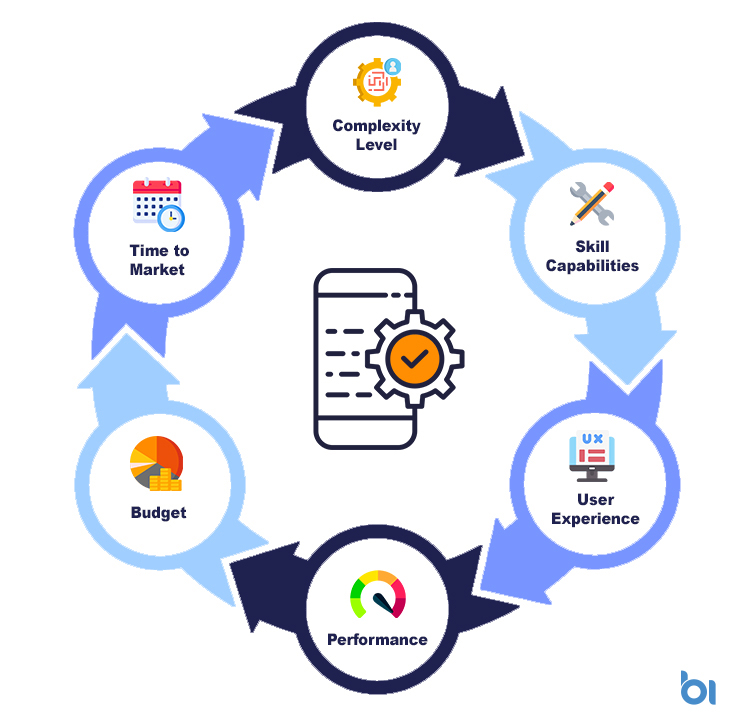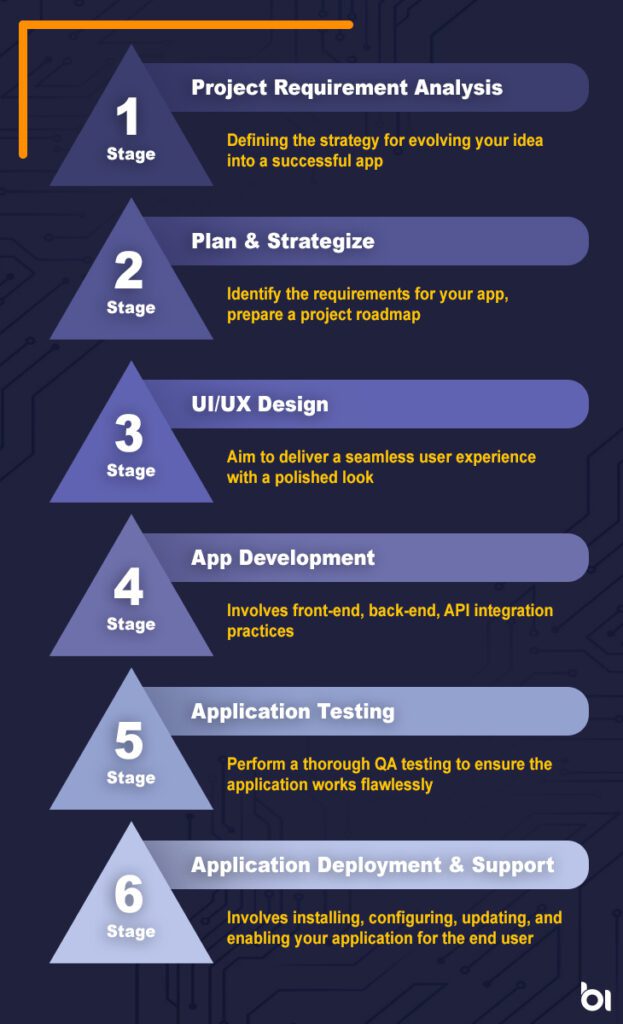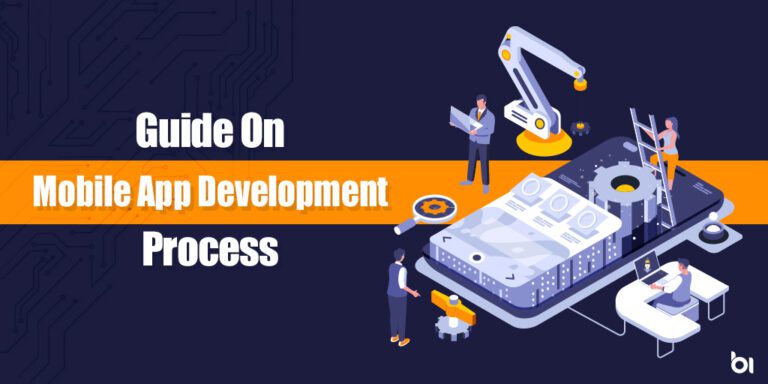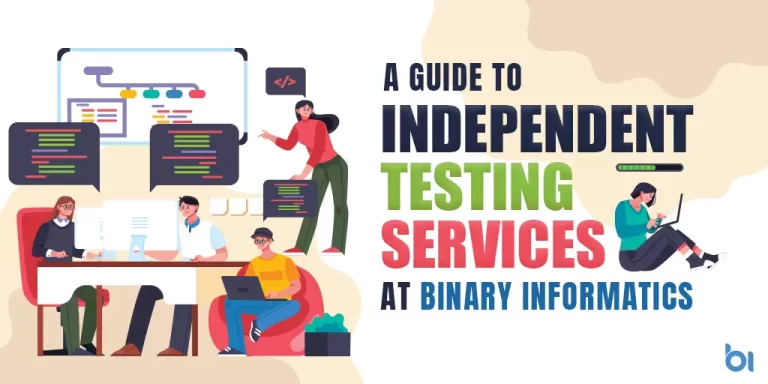Every industry today, be it retail, telecommunications, and e-commerce to insurance, need customized applications to understand and meet their customer expectations & serve them better in real-time. According to recent research (42Matters), about
70,000 new Android apps are released every month on the Google Play Store.
32,000 new iOS apps are released in the Apple App Store every month.
Of cause, these smart mobile applications facilitate a convenient way to conduct transactions and access information. To stay relevant, responsive, and successful, every business be it SMBs or enterprise-level organizations need to develop the mobile applications that their customers, partners, and employees demand.
This post will help you know what are the requirements for developing an app, every step required to develop a successful mobile application. Today, we are going to share a six-step mobile app development process , ensuring great development.
Before moving forward with the mobile app development process, let’s get an eye on factors to consider for successful mobile app development.
Table of Contents
ToggleMobile APP Development Process: Factors to Consider

Complexity Level
Be clear on your App Development Project complexity level, Suppose you want to develop a blog application. Which simply needs to display information in text, image, or video format. It is simpler to implement than an advanced eCommerce application with data security, a secure transaction gateway, and more advanced features considering the business requirements.
Skill Capabilities Check
Understanding your App Development Project requirements, there is a very strong need to check skill capabilities before starting the app development process.
- Skills to use cross-platform mobile suites like Account management promotion (AMP) and Antenna
- Familiarity with APIs and platforms like iOS, Android, and Windows
- Knowledge of platform-specific web development languages like HTML 5, CSS, and common programming languages like C# and Java, must have a check on technical capabilities.
User Experience
Considering UX-effecting factors and clear navigation with simple and intuitive design elements is crucial for every app development project. What are your competitors failing to deliver and how can you fill that gap? So that you can get a clear strategy for enhancing UX. Getting visibility on UX requirements will help you choose the right app development approach.
Performance
What kind of performance & speed are end-user expecting and your competitors failing to deliver is the key to succeed your app development project? Knowing this will help you choose the right tech stack and app development approach.
Budget
What is your budget? Getting visibility on a budget will help you decide among the 5 main development approaches:
- Native App Development – expensive
- Hybrid App Development- less costly
- Cross-Platform App Development – not so expensive
- Rapid Mobile App Development(RMAD)- lower investment
- Progressive Web App Development – Need lower Investment
So, if you have a good budget, we can go for Native, otherwise, it would be good even with cross-platform app development or PWA.
Time to Market
If you go for Native app development or cross-platform app development, it could take a long time whereas PWAs, would take very less time. Getting visible on time will help you choose the right Mobile app development tools & approach and streamline your mobile app development process.
Now let’s get started with …
Mobile APP Development Process Binary Informatics Follows
How to Get Started With Mobile App Development Process? We have broken down the mobile app development process into six stages essential for creating a successful mobile application for your business.

Mobile App Development Process Stage1: Project requirement analysis
This is the initial stage of the mobile app development project, involves-
- Defining the app’s purpose
- Understanding business needs
- Studying Market Competition
- Identifying your target audiences
- Identifying what your competitors are failing to deliver
All this helps you establish clear end goals and objectives and according strategize your app development process.
Read also: Offshore software development services
Mobile App Development Process Stage 2: Plan & Strategize
At this stage, planning & strategy-making get started as per the information gathered from the “Project requirement analysis” stage. At this stage, you have to define the use cases and capture functional requirements by defining-
- app development budget
- Timeline
- Skill Set required
- Development milestones
- Tools & technology resources
- App USP
- Name & domain for your app
This stage would help you choose the right framework, tech stack, and app development approach.
Mobile App Development Process Stage 3: UI/UX Design
The core focus of this app development project stage is to design an app that delivers seamless and effortless user experiences. Work on finalizing-
- Information architecture and workflow
- Implementing design on mobile websites.
- Define technical architecture & technology stack
- Wireframe (Visual structure of app functional requirement)
- Style Guide according to brand guidelines (color themes, typefaces, graphics)
- Mockups on modification of information architecture, workflow & esthetics.
- Interactive prototype with tools like Invision & Figma.
This stage of the app development process is focused to build an app design strategy, it helps you ensure consistency across your app’s look and feel and meet the design standards.
Mobile App Development Process Stage 4: App Development
After completing planning, actual development starts at this stage. Mobile app development on practical ground consists of three development parts-
Front-end development– Optimizing the user experience using HTML, JavaScript, and CSS, coding, developing and maintaining the user interface, and managing software workflow.
Back-end development- Build and maintain the mechanisms that process data and perform actions on websites including data storage, security, and other server-side functions.
Implementing API (Scalable & secure interface for efficient data exchange between front end and back end ).
Finalizing the right mobile development approach from
- Native mobile application development
- Cross-platform application development
- Hybrid app development
- Progressive Web Application development
Integrate Applications from external APIs to get
- Single or multi-factor authentication for user sign-in/sign up
- Payment processing
- Location tracking
- Chatbot integration
- Cloud data storage
- CRM integration and so on.
Once you are done with application development, the next stage is thorough application testing to validate application functionality, and code structure as per the previously defined requirement specification document.
Mobile App Development Process Stage 5: Application Testing
When you develop a new application, it is inevitable to keep testing the app. Regardless of the mobile app type, our QA team always performs necessary test cases to ensure the app is bug-free and works flawlessly.
Here are the difference between functional and non-functional tests developed application has to pass threw
- User acceptance testing
- Functional testing
- Performance testing
- Security testing
- Device and performance testing
All these tests help you evaluate and verify that the final software product or application is bug-free and does what it is supposed to do. It helps in keeping the development cost low and building a high-quality app and reducing the chances of app development project failure.
Once the testing is done, the development application is ready for deployment.
Mobile App Development Process Stage 6: Application Deployment & Support
At this stage, the app is deployed on the respective platforms and web servers. Software deployment is the process of installing, configuring, updating, and enabling one application or suite of applications that make a software system available for the end user.
During or after the mobile application development process, if any issue or bug is detected, it needs to be fixed instantly for ensuring consistent performance. The app development process is ongoing, applications need regular support and maintenance to ensure multifold return on investment.
We hope by reading this you would have understood the complete mobile app development process. The success of any mobile app development project highly depends upon how effectively you have performed at each stage.
Read also: 11 Blockchain Development Challenges Resisting Blockchain Adoption
Ready to Get Start Your Mobile App Development Process?
The success of your mobile app depends on how effectively you have planned & executed the app development process. If you are not technically sound, it’s better to consult a professional mobile app development company like Binary Informatics.
Looking for a development partner to help you drive business value with a strong mobile application? Being a custom mobile app development company, we have developed hundreds of mobile apps on Android and iOS platforms. If you want to explore more about mobile app development or want to discuss your project, feel free to reach us.
Here are a few more interesting reads:
Growing iOS app development trends in 2022 (And Beyond)
How to Choose the Best Blockchain Development Platform? 5 Most Reliable
Have an App Idea?
Talk to our app consultants and we will help you to build customized mobile apps according to your requirements.




